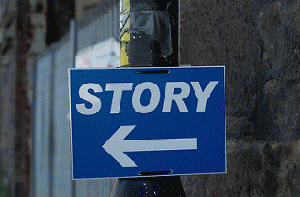This article was originally published on The Intelligent Content Blog in advance of Michael's keynote at the Intelligent Content Conference, produced by Content Marketing Institute.
It's not surprising that Michael Margolis begins one of his TEDx talks like this: "I'm a junior in college and I'm walking along-- Stories and storytelling are Michael's business and his passion.
I was delighted to chat with Michael recently by phone to explore what he has to say about the power of storytelling in the digital age. Here's what I learned.
A story worth telling"As human beings, we are experience-seeking, storytelling machines," Michael says. "We are constantly seeking stories. Think of yourself at the coffee shop with friends. 'What are you doing? What's new? What's going on?'"
What does storytelling have to do with intelligent content and content marketing? A lot.
Michael explains, "The way people respond to any brand is not about the content, but about the story they tell themselves about what that content means to them."
Trained as an anthropologist, Michael talks a lot about culture and emotions. If we want to create change, whether it's changing someone's attitude or understanding or product choice, then we must take the time to understand that person's existing culture. What's that person's story? How does he or she feel about it? Only after we answer these questions can we tell our own story in a way that will resonate and inspire change.
This isn't always easy to do. "We're good at being literal, but the moment you move in to emotional content and nuance, the system falls down," he says.
A story worth telling -- a story that can transform the audience in some way -- takes listeners on a journey from their starting point to a new understanding. Good storytelling is about more than telling a better anecdote; it's about how we relate to each other and to what we are creating.
"We want to invite people to think about human elements and factors that show up in the way we build intelligent content because story is all about people and the relationships between them," Michael says.
Creating a new language of storytelling"I graduated from college in 1998, right as the new Internet economy burst," Michael says. "As a social entrepreneur, I felt that there was something missing from the conversation. People talked about social change in a way that didn't sit right with me. Honestly, I didn't have the language; I didn't know how to tell a different story. But I knew that the way we talked about the current story needed to change."
Michael became obsessed with figuring out how to translate new or different ideas into cultural acceptance. He explored the effects of innovation and technology on social and organizational habits. After years of consulting with large companies, like Bloomberg, SAP, Greenpeace, and others, Michael has developed 15 axioms:
- People don't buy a product, service, or idea; they buy the story that's attached to it.
- Your brand is far more than a name, a logo, or a tagline; it's the stories that people tell about you.
- Every story exists in relationship to everything else around it.
- We all want to look back at the story of our lives and know that it made sense.
- The stories we tell literally make our world.
- The power of your story grows exponentially as more and more people accept your story as their truth.
- If you want to learn about a culture, listen to the stories. If you want to change a culture, change the stories.
- Leaders lead by telling stories that give others permission to lead, not follow.
- Storytelling is our most basic technology, turbocharged through 21st century innovation.
- We all seek to experience life in heroic terms.
- Nobody likes a change story, especially a change story we have no control over. What people really need is a continuity story.
- Our fate as a species is contained in the story. Both tyranny and freedom are constructed through well-supported narratives.
- Storytelling empowers because it escapes the need to claim absolute truth.
- Reinvention is the new storyline.
- Storytelling is like fortune-telling. The act of choosing a certain story determines the probability of the outcomes.
For more on these axioms, you can download Michael's 88-page book for free at Believe Me: A Storytelling Manifesto for Change-Makers and Innovators. As he points out in the book's introduction, "The secret to persuasion, influence, and motivation is a formula deeply grounded in storytelling."
An old story in a new formStorytelling has been around for thousands of years. Our challenge -- and the challenge that Michael will be talking about in his ICC keynote talk -- is integrating the architecture of storytelling into the range of digital delivery mechanisms available today.






